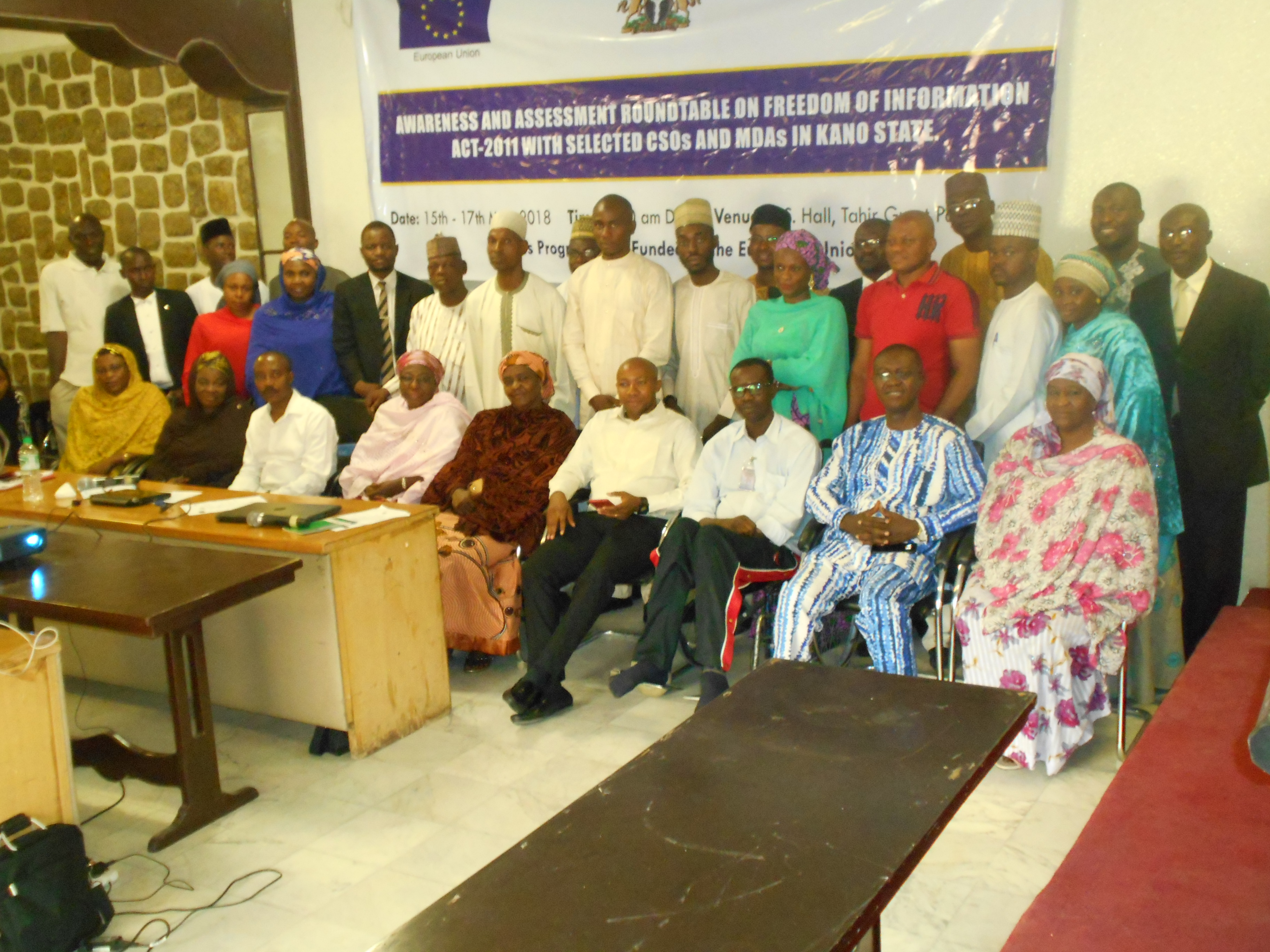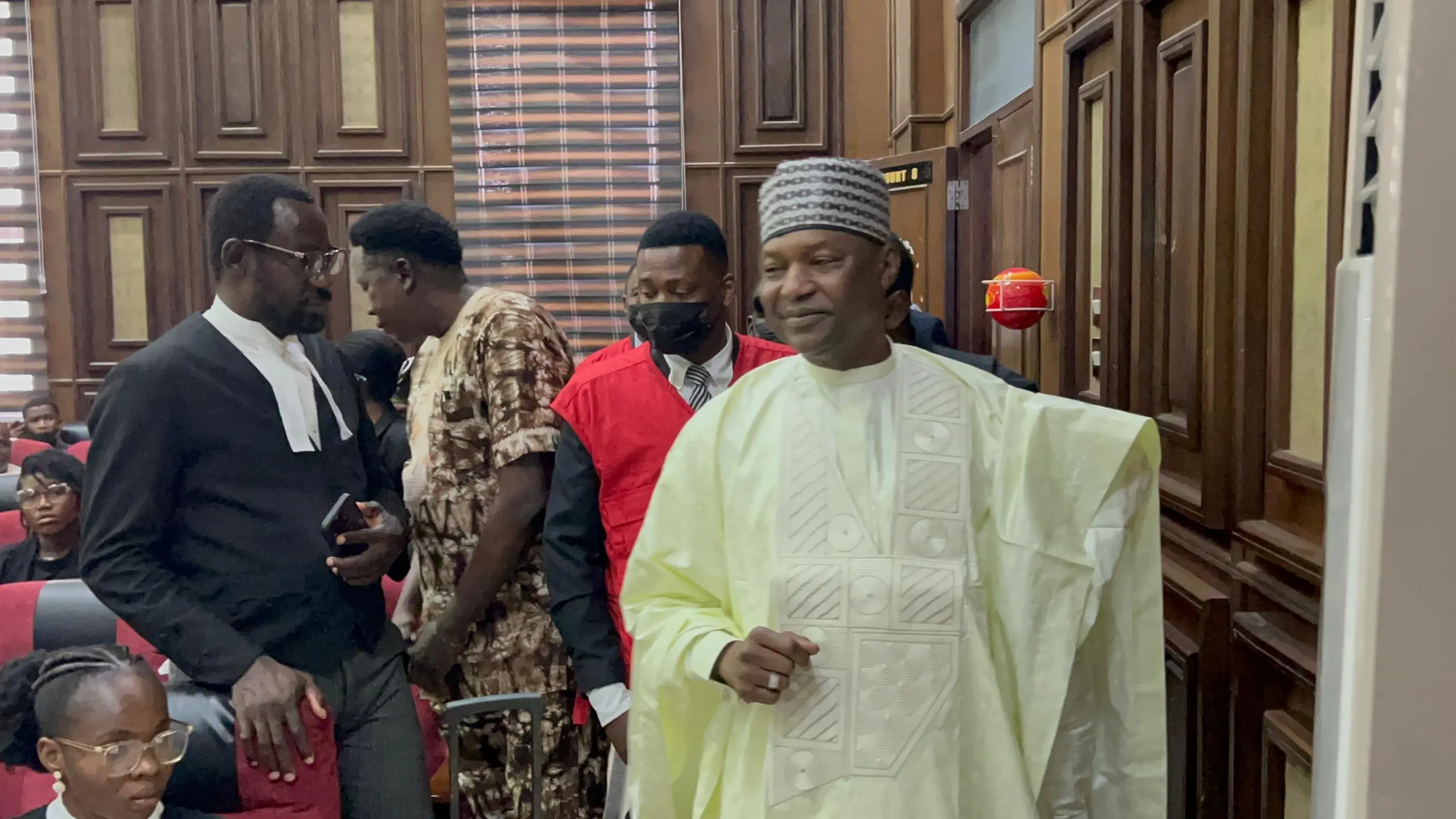General
Kano, Adamawa to Operationalize, Adopt FOI Act

By Destiny Ugorji
Two Northern Nigerian States, Kano and Adamawa, have expressed their readiness to adopt and operationalize the Freedom of Information (FOI) Act 2011.
Kano State Head of Civil Service, Alhaji Mohammad Auwal Na’iya, made the state government’s position known while delivering a goodwill message on Thursday at an FOI Assessment and Awareness joint Roundtable of Ministries, Departments and Agencies (MDAs) and Civil Society organisations in the State.
According to him, the Kano state government is in the process of adopting the Freedom of Information Act, with a view to empowering the citizens to participate actively in governance.
“Kano State government is committed to transparency and accountability and is in the process of adopting the Freedom of Information law in the State. The state government has initiated a number of processes to promote transparency, accountability and prudence in governance.
“The Kano State government has agreed to adopt and implement the Freedom of Information Act through the Open Government Partnership (OGP) process which the State has signed unto. The adoption of the FOI Act in the State is being subjected to wide consultation and will go through the legislative process and passed into law”, he disclosed.
Adding his voice, Executive Chairman, Kano State Public Complaints and Anti-Corruption Commission (PCACC) Alhaji Muhuyi Magaji Rimingado further highlighted the efforts of the present administration in the state to entrench transparency and accountability.
“The government of Alhaji Abdullahi Umar Ganduje in Kano State is doing so much to ensure that governance is transparent. We are interested in the implementation of the FOI Act in Kano State and the government at the highest level in the state is committed to it, since it will promote openness in governance. The State has signed up to the Open Government Partnership, which is a transparency initiative. Access to Information is one of the pillars of the OGP and we are committed to it. The present administration created the Public Complaints and Anti-corruption Commission, among other reformatory initiatives. The present administration is sincere and wants the citizens to participate actively in the business of governance.”
The Roundtable was a 3-day event, organized by the Freedom of Information Coalition, Nigeria (FOICN) and Media Initiative against Injustice, Violence and Corruption (MIIVOC), with support from the European Union, through the Rule of Law and Anti-Corruption (RoLAC) Programme, managed by the British Council.
The event which took place at Tahir Guest Palace Hotel, Kano, had participants drawn from state and non-state actors in the state. The primary objective was to assess the level of awareness and implementation of, and compliance with the Freedom of Information (FOI) Act, 2011 in the State.
In his presentations on: Understanding the Freedom of Information Act 2011 and Making Requests for Information Under the Freedom of Information Act, Chairman, Board of Governors, Freedom of Information Coalition, Nigeria, Dr, Walter Duru described the Freedom of Information Act as a veritable tool for the entrenchment of transparency in the state, even as he called on stakeholders to collaborate to ensure its effective implementation.
He commended the Kano State government for committing to FOI implementation, even as he urged Civil Society organisations in the state to take advantage of the development to participate actively in governance, by testing the Act in the state.
Also, in his presentation on: What is Freedom of Information and its importance, Secretary, Board of the Freedom of Information Coalition, Nigeria, Ayode Longe described freedom of Information as the bedrock and foundation of all human rights, urging citizens to participate actively in the drive towards the operationalization of the FOI Act in the state.
Earlier in his presentation, Anti-corruption Programme Manager of the ROLAC programme, Mr. Emmanuel Uche described the Freedom of Information Act as central to every anti-corruption initiative, even as he commended the Kano State government for embracing the Act.
He reiterated the readiness of the ROLAC programme to support further steps that will enhance FOI implementation in the state and beyond.
The roundtable recorded various sessions, comprising presentations, situation assessment through administration of questionnaires, feedback through questions and comments and viewing of a video on how members of a rural Indian community called Rajasthan successfully used the country’s FOI law to hold their elected officials to account for funds that they administered, and the ripple effect it had in the State which entrenched transparency.
Other highlights of the Roundtable are the development of Action Points, outlining next steps, interactive sessions, advocacy visits and a Communique issued at the end of the event. Other important persons at the event are: Anti-corruption programme officer, Pwanakei Dala, head of ROLAC Kano Office, Ibrahim Bello, among others.
Kano is one of the four focal states of the RoLAC programme. The other three are: Adamawa, Lagos and Anambra states.
Similarly, the Adamawa State government has expressed its readiness to operationalize the Freedom of Information Act in the state.
Adamawa state Attorney General and Commissioner for Justice, Mr. Bala Sanga disclosed this while delivering a goodwill message during a similar Roundtable for Ministries, Departments and Agencies, as well as Civil Society Organisations in Adamawa state, recently.
He affirmed that the FOI Act was germane to democracy and good governance, even as he described the present Adamawa state government as transparent. He emphasized that government officials serve the people and should therefore be accountable to them.
“The present Adamawa state government is transparent and willing to do things right. We are in total support and willing to operationalize the Freedom of Information Act in the state. Apart from the FOI Act, public officials have a responsibility to be transparent. If public officials have nothing to hide, then they have nothing to fear about an access to information law.”
He further promised to advise the state Executive Council to ensure the operationalization of the Freedom of Information Act in the State, even as he urged the organisers of the event to transmit the Action Points from the meeting to his office for necessary actions.
The next port of call for the FOI Assessment Roundtable is Anambra State, expected to hold in the next two weeks. The FOI Assessment Roundtable is a prelude to further interventions aimed at pursuing the vigorous implementation of the FOI Act, with a view to entrenching transparency in governance, while empowering citizens to take advantage of the Act to hold the government accountable.
General
NISO Attributes Electricity Woes to Inadequate Gas Supply

By Adedapo Adesanya
The Nigerian Independent System Operator (NISO) has attributed the poor power supply facing a considerable number of Nigerians to inadequate gas supply to thermal power plants.
Business Post reports that epileptic power supply has plagued consumers in Lagos, Oyo, Abuja, and Osun, among others, this month, leading to worries. Also, some businesses have recorded losses due to the epileptic power supply in their areas.
In a statement posted on its X handle, NISO disclosed that average available generation on the national grid currently stands at about 4,300 megawatts (MW), with the low output primarily attributed to gas supply constraints.
The system operator noted that thermal power plants, which account for the dominant share of Nigeria’s electricity generation mix, require an estimated 1,629.75 million standard cubic feet (MMSCF) of gas per day to operate at optimal capacity. However, as of February 23, 2026, actual gas supply to the plants was approximately 692.00 MMSCF per day.
The available supply represents less than 43 per cent of the daily gas requirement, resulting in constrained generation output and reduced electricity allocation to Distribution Companies (DisCos).
NISO, which independently manages the nation’s electricity grid, explained that any disruption or limitation in gas supply directly affects available generation capacity and overall grid output, given the heavy reliance on thermal plants.
It added that when total system generation drops significantly, the operator is compelled to implement load shedding across the network while dispatching available energy in line with allocation percentages approved under the Multi-Year Tariff Order (MYTO) framework of the Nigerian Electricity Regulatory Commission (NERC), to maintain grid stability and prevent system disturbances.
While expressing regret over the inconvenience to electricity consumers and market participants, NISO said it is working closely with relevant stakeholders to restore full energy allocation once gas supply improves and generation capacity returns to normal levels.
General
EFCC Re-Arraigns ex-AGF Malami, Wife, Son Over Alleged Money Laundering

By Adedapo Adesanya
The Economic and Financial Crimes Commission (EFCC) has re-arraigned former Attorney-General of the Federation (AGF), Mr Abubakar Malami (SAN), his wife, Mrs Asabe Bashir, and son, Mr Abdulaziz Malami, on money laundering charges.
They were brought before Justice Joyce Abdulmalik of the Federal High Court in Abuja, following the re-assignment of the case to the new trial judge.
Upon resumed hearing, EFCC’s lawyer, Mr Jibrin Okutepa (SAN), informed the court that the matter was scheduled for defendants’ re-arraignment.
“The matter is coming before your lordship this morning for the very first time. I will be applying for the plea of the defendants to be taken,” he said.
Mr Okutepa equally applied that the sums listed in Counts 11 and 12 be corrected to read N325 million instead of N325 billion for Count 11, and N120 million instead of N120 billion for Count 12.
When it was not opposed by the defence lawyer, Mr Joseph Daudu (SAN), Justice Abdulmalik granted the oral application by Mr Okutepa.
The defendants, however, pleaded not guilty to the 16 counts preferred against them by the anti-graft agency bordering on money laundering.
Justice Obiora Egwuatu had, on February 12, withdrawn from the case shortly after the civil case filed by the EFCC was brought to him.
The case was formerly before Justice Emeka Nwite, who sat as a vacation judge during the Christmas/New Year break.
After the vacation period, the CJ reassigned the cases to Justice Egwuatu, who had now recused himself, before it was reassigned to Justice Abdulmalik.
The former AGF, his wife, and son were earlier arraigned before Justice Nwite on December 30, 2025.
While Malami and his son were remanded at Kuje Correctional Centre, Asabe was remanded at Suleja Correctional Centre before they were admitted to N500 million bail each, on January 7, with two sureties each in the like sum.
General
INEC Shifts 2027 Presidential, N’Assembly Elections to January 16

By Adedapo Adesanya
Nigeria will hold next year’s presidential and National Assembly elections a month earlier than planned, after the Independent National Electoral Commission (INEC) revised the polling schedule.
The elections will be held on January 16, instead of the previously announced date of February 20, INEC said in an X post, signed by Mr Mohammed Kudu Haruna, National Commissioner and Chairman, Information and Voter Education Committee.
There were also changes to the Governorship and State Houses of Assembly elections initially fixed for Saturday, March 6 2027, in line with the Electoral Act, 2022, have now been moved to Saturday, February 6, 2027.
The electoral commission said the changes were caused by the enactment of the Electoral Act, 2026 and the repeal of the Electoral Act, 2022, which introduced adjustments to statutory timelines governing pre-election and electoral activities.
“The Commission reviewed and realigned the schedule to ensure compliance with the new legal framework,” it said.
INEC said party primaries (including resolution of disputes) will commence on April 23, 2026 and end on May 30, 2026, after which Presidential and National Assembly campaigns will begin on August 19, 2026, while Governorship and State Houses of Assembly campaigns will begin on September 9, 2026.
It noted that campaigns will end 24 hours before Election Day, and political parties have been advised to strictly adhere to the timelines.
INEC also stated it will enforce compliance with the law.
The electoral body also rescheduled the Osun Governorship election which was earlier scheduled for Saturday, August 8 2026, by a week to Saturday, August 15, 2026.
INEC noted that some activities regarding the Ekiti and Osun governorship elections have already been conducted, and the remaining activities will be implemented in accordance with the Electoral Act, 2026.
Speaking at a news briefing in Abuja two weeks ago, the chairman of INEC, Mr Joash Amupitan, expressed the readiness of the commission to conduct the polls next year.
The timetable issued by the organisation for the polls at the time came when the federal parliament had yet to transmit the amended electoral bill to President Bola Tinubu for assent.
Later that week, the Senate passed the electoral bill, reducing the notice of elections from 360 days to 180 days, while the transmission of results was mandated with a proviso.
-

 Feature/OPED6 years ago
Feature/OPED6 years agoDavos was Different this year
-
Travel/Tourism10 years ago
Lagos Seals Western Lodge Hotel In Ikorodu
-

 Showbiz3 years ago
Showbiz3 years agoEstranged Lover Releases Videos of Empress Njamah Bathing
-

 Banking8 years ago
Banking8 years agoSort Codes of GTBank Branches in Nigeria
-

 Economy3 years ago
Economy3 years agoSubsidy Removal: CNG at N130 Per Litre Cheaper Than Petrol—IPMAN
-

 Banking3 years ago
Banking3 years agoSort Codes of UBA Branches in Nigeria
-

 Banking3 years ago
Banking3 years agoFirst Bank Announces Planned Downtime
-

 Sports3 years ago
Sports3 years agoHighest Paid Nigerian Footballer – How Much Do Nigerian Footballers Earn














